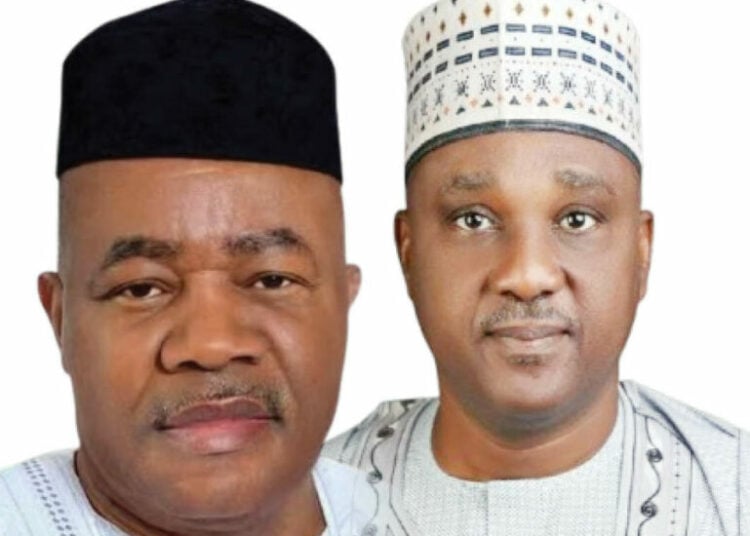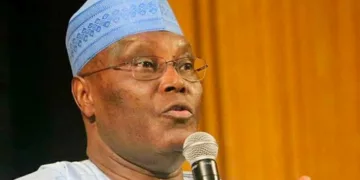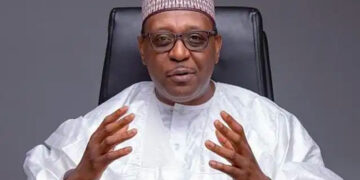From the Athenian democracy when the Assembly (Ecclesia) – the main body of male citizens could attend, speak and vote on crucial matters of state to the present day democratic governance, the legislature remains the cardinal feature of this system of government.
Nigeria in her 65 years of nationhood, has experimented democracy at different intervals, with the longest being from 1999 to date. In each democratic experiment in the country, one critical institution that defines this generally believed best form of government is the legislature.
The fundamental question on the lips of many observers which appear to have defied a precise answer is whether the National Assembly is a blessing or curse for Nigeria’s democracy?
According to pundits, the National Assembly at different intervals or sessions since independence appears to be both a blessing and curse for Nigeria’s democracy in the discharge of its fundamental functions of lawmaking, oversight and representation.
The argument is that through some impactful and people oriented laws passed, interventions in critical national issues; checks and balances, proper oversight of the executive, the National Assembly is a blessing to Nigeria’s democracy.
However, when the National Assembly becomes complacent in the discharge of these functions or acts to the whims and caprices of the executive to the detriment of the people, it is considered a curse to democracy.
One instance that remains outstanding, especially in the present democratic dispensation, was the aborted third term of former president, Chief Olusegun Obasanjo, generally believed to have been orchestrated by the 5th Assembly.
Speaking on the matter recently, the former Senate President, Ken Nnamani, said by adjourning the Senate in the course of the constitutional amendment process, some senators in support of the bill had a change of mind after interacting with their constituents.
Nnamani also disclosed that the live transmission of the plenary on May 16, 2006, when an alteration of the constitution to allow three terms for Nigeria’s presidents, forced some senators to abandon support for the bill seeking a third term for Obasanjo.
“To be an informed trustee, the senators need to understand the view of their constituents before casting their votes. On this basis, the Senate adjourned to allow the senators to consult with their constituents about the constitution amendment. With this intervention, some senators returned with enlightened views.
“We decided to televise the proceedings. Publicising the proceedings was not supported by those who wanted to smuggle into the Constitution the extension of tenure through undefined and darkened procedure,” he said at the public presentation of his book: “STANDING STRONG: Legislative Reforms, Third Term and Other Issues of the 5th Senate.
Coming on the heels of that was the Senate’s enforcement of Section 145 of the Constitution in 2010 recongising the then Vice-President Goodluck Jonathan as acting president during the continued ill-health and absence of now deceased former President Umaru Yar’Adua, christened doctrine of necessity.
Hitherto, when Obasanjo vetoed the Niger Delta Development Commission (NDDC)
bill, the House of Representatives overrode the veto in 2000 while the Senate passed the law establishing the NDDC which is a model for the establishment of regional development commissions.
Also in the previous Assembly, the Senate rejected the nomination of Lauretta Onochie as a national commissioner for the Independent National Electoral Commission.
While it claimed that the action was based on federal character principle, the general belief was that the action was informed by the controversy surrounding her appointment on account of partisanship.
While these and others could be considered as National Assembly’s blessing to Nigeria’s democracy, there are equally instances where the action or inactions of the apex legislature portray it as a curse to the very system that is its oxygen of existence, hence history shows that the institution is the first victim of abrogation of democratic rule.
There is a general belief among Nigerians that the National Assembly is a toothless bulldog which barks at the executive without biting or plays along with the very arm of government which it is empowered to oversight, bringing about the sobriquet of rubber-stamp assembly.
Instances abound where the National Assembly in the discharge of its oversight function embarked on probes which did not see the light of the day or their outcomes were not known till the end of a particular legislative session.
In the 9th Assembly for example, particularly in the House of Representatives one of the probes which generated much public interest but went the way of the others was the investigation into the financial malfeasance in the Niger Delta Development Commission (NDDC), resulting to a missing N40 billion and illegal expenditure of N81.5 billion.
Similarly, the 10th Assembly has from its inauguration to date embarked on series of probes. Some are investigations into the $5.79bn Mambila Hydroelectric Power Project, multi billion dollars spent on turnaround maintenance of refineries in the last ten years, alleged uneven disbursement of intervention loans to the tune of N483 billion by the Development Bank of Nigeria (DBN); oil theft; N4 trillion revenue loss from tax incentive, waiver ‘abuses.’
There is also the probe into alleged non-remittance of N2trn, other taxes by NNPCL and N30trn Ways and Means probe and $18.5bn Abuja Centenary City Project by an ad hoc committee, chaired by Deputy Senate President Barau Jibrin.
Also, at the beginning of the 10th Assembly, the House embarked on investigation into job racketeering in MDAs where a can of worms were opened.
During the investigation, commissioners of the Federal Character Commission (FCC) made damning allegations against the commission’s chairman, Dr Muheeba Dankaka who equally threw the garbage at them.
One of the commissioners alleged that,” she (Dankaka)) do collect 10% from all MDAs of all the employment she is signing. All those 10% she is collecting, those are the slots that she employs agents that are selling.
Again the House embarked on investigation of the importation of adulterated petroleum products, non-availability of crude oil for domestic refineries, and other critical energy security issues but mid-way dissolved the ad-hoc Joint Downstream and Midstream Committee saddled with the responsibility and reconstituted another committee.
All these probes, the outcome is yet to be known as at last checks while many others are on ground.
Apart from the endless probes, the National Assembly is almost always accused of being a rubber-stamp in the hands of the executive, approving its requests including executive bills, borrowing, appointments, extension of budgets, among others with dispatch.
However, defending the National Assembly on this recently, the leader of the Senate, Opeyemi Bamidele, dismissed accusations from opposition parties labelling the institution a “rubber-stamp” institution.
He insisted that such claims lack merit and ignore the legislature’s behind-the-scenes engagements.
“If we are actually a rubber-stamp parliamentary institution as most opposition political parties have claimed, the bills would have been passed within one week or two weeks after they were laid before us,” he said.
Referencing the 2025 Appropriation Act laid in December, 2024 as another example of the Assembly’s diligence, Bamidele said: “we did not give the budget back to the executive until February 2025. We did a lot of due diligence. Every committee of the National Assembly duly engaged heads of agencies to properly scrutinise the budget also in the overriding public interest.”
He said the consistent claim of being a rubber-stamp body ignores the National Assembly’s responsibility to balance efficiency with scrutiny.
“We are working in the interest of the people. We are always taking into consideration the need to ensure good governance in all our undertakings and the need to use legislative frameworks to promote good governance in the federation,”the Senate leader noted.
Speaking on the issue, a lecturer in the department of political science, Nnamdi Azikiwe University, Dr Christian Okeke, said it is difficult to conclude whether the National Assembly is a blessing or curse to the country’s democracy.
He said: “to assess National Assembly of Nigeria from independence is difficult because of the several phases with largely unique characteristics.
“Ordinarily, the parliament ought to act as the saviour of the Nigerian people from the rudderless and infantile political leadership witnessed since 1960.
Nevertheless, some of the assemblies have largely performed outstandingly and squared it up with the executive rascality at the time.
“For instance, the 5th Senate led by Ken Nnamani and the 8th National Assembly chaired by Bukola Saraki were notable with outstanding performances.
“Those assemblies provided the needed checks and balances and exhibited independence.
Sadly, there are some that were a far cry from expectation, choosing rather to dine and wine with the executive arm against the interest of the poor.
“As the country marks her 65th independence anniversary and to the man on the street, the current NASS has not won the hearts of Nigerians as a beacon of hope.
It has not risen in clear defence of the poor, instead has gone ahead to approve new taxes and external borrowings.
“This NASS has the opportunity but so far failed to reduce the cost of governance in the country to alleviate poverty and free funds for developmental projects.
It has not made leadership accountable and itself has failed to be transparent.
“This assembly has not made the people to experience the joy of independence through pro-poor legislations. The unimaginable sufferings and deaths being experienced are nothing of concern to this assembly. The poor do not know why this assembly exists in the first place.”
Also, a lecturer in the Political Science Department, Federal University of Kashere, Gombe State, Dr Terna Vincent Tavershima said there is no democracy without the parliament and to that extent, the National Assembly is a blessing.
“A blessing to the extent that once the National Assembly is not there, then democracy will cease to exist in Nigeria.
Once the military takes over government, the only arm of government that they suspend is the legislature and in this case, the parliament.
“The parliament is there to make laws for the good governance of the country. They are also there to oversight the executive arm of government and to also represent the people.They are, therefore, the voice of the people now.
“When you ask whether the National Assembly is a blessing or a curse to Nigeria’s democracy, like I earlier said, for me, it is a blessing because it is the National Assembly that has from time to time, made laws or amended laws for the good governance of the Nigerian society,” he said.
In specifics, the scholar argued that, “for instance, when Obasanjo came to power in 1999 and muted the idea of a third term, meaning he wanted to stay in power more than the constitutionally provided term of office, it was the National Assembly that stopped him from executing that particular thinking that he had. And you know, without the National Assembly, Obasanjo would have stayed in power for as long as he wanted.
“It is this same National Assembly that as you know, that has reviewed law, electoral law, brought in the issue of BIVAS, brought in the issue of, what do we call it, smart card reader, and a lot of that. And a sitting president was defeated in this country just because the National Assembly made a law for the use of a smart card and Buhari was able to come to power because the smart card was invented.
“And the National Assembly gave INEC the powers to regulate its activities and bring out those issues that they see would give them direct, credible elections. So the National Assembly, to a large extent, they have stood for the people and that if at the end of the day there are some issues with the National Assembly as to the non-representation of the people or rubber-stamping everything that the executive brings to it, that shouldn’t give us a cause to completely say that the National Assembly is a curse.
“If you look at our history, once the military comes to power to suspend the constitution, then they send out a National Assembly that is responsible for that. So for me, even though we have not had a perfect democracy, which there is no perfect democracy in the world, the National Assembly is playing its constitutional role to ensure that we have a special society and with time, gradually, step by step, we will get there and our democracy will be the envy of other nations.
“I am an inseparable optimist that one day this country will be better through good laws and the execution of such laws in this country. So to answer your question directly, the National Assembly has been a blessing to the Nigerian society.”
For his part, the executive director, CREAP Africa Initiative, Sylvanus Udoenoh, said while the National Assembly has provided a platform for debate, checks and balances, and has occasionally stood firm in defending democratic principles, persistent concerns about ineffective oversight, delayed legislative actions, self-serving politics and lack of transparency have weakened public trust of the institution.
“It is important to reflect on the role of the National Assembly in strengthening or weakening our democracy. The legislature remains the heartbeat of democratic governance, entrusted with lawmaking, oversight, and representation. While citizens are increasingly questioning whether the National Assembly has lived up to this mandate, or fallen short, it is important to reflect on the role it plays in the shaping of our democracy, and the areas it has failed to live up to.
“On one hand, the National Assembly has provided a platform for debate, checks and balances, and has occasionally stood firm in defending democratic principles. However, persistent concerns about ineffective oversight, delayed legislative actions, self-serving politics, and lack of transparency have weakened public trust.
What we constantly see in recent times has been probes that end without results, budgets padded without accountability, and laws crafted without true consultation.
“For Nigeria’s democracy to thrive, the National Assembly must be a blessing and not a burden. It must recommit to the ideals of integrity, transparency, and citizen-centered legislation. Lawmakers should rise above personal and partisan interests to become genuine champions of the people.
“At 65 years of independence, Nigeria cannot afford a legislature that merely occupies space; we need legislatures that inspire hope, strengthen institutions, and drive national development.
“It is why we, as an organisation, constantly call for a people-driven National Assembly—one that listens, acts, and delivers in the spirit of democracy. The true test is not in the number of bills passed, but in how governance impacts the lives of ordinary Nigerians,” he stated.





